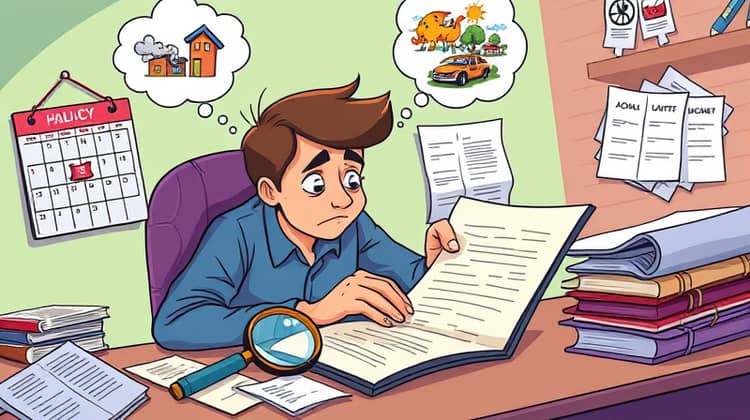Insurance is one of those necessary evils that we all have to deal with, whether we like it or not. Yet, many people make critical mistakes when it comes to selecting and maintaining their insurance policies. Understanding these common pitfalls can save you time, money, and a whole lot of frustration. In this article, we will explore seven common insurance mistakes and offer tips on how to avoid them, allowing you to make more informed decisions and better protect your assets.
Whether you're looking for auto, home, health, or life insurance, the same basic principles apply. The goal is to find the right coverage that fits your specific needs while also being financially manageable. By avoiding these mistakes, you'll not only safeguard your financial future but also ensure you're adequately covered in case of unforeseen circumstances. Let's take a closer look at each of these common insurance mistakes.
The journey of finding the right insurance can often feel overwhelming due to the vast array of options available. However, with the right knowledge and awareness of common missteps, you can navigate this complex landscape more effectively. Let's delve into these seven common insurance mistakes that everyone should strive to avoid.
1. Not Shopping Around

One of the most prevalent mistakes people make when looking for insurance is failing to explore multiple providers and policies before making a decision. Many individuals mistakenly believe that the first policy they encounter is the best option available. In reality, insurance premiums can vary significantly between different companies and policies.
Not taking the time to compare different insurance plans can lead to paying higher premiums than necessary or, worse, opting for an inadequate coverage plan. With the internet making it easier than ever to gather information, there's no reason not to thoroughly shop around for the best options.
Additionally, many insurance companies offer unique discounts and benefits, so comparing multiple policies can provide valuable insights into which company truly offers the best value for your specific needs.
- Obtain quotes from at least three insurance companies before making a decision.
- Consider using online comparison tools to view options side by side.
- Don't be swayed by advertisements; always check customer reviews and ratings.
2. Underestimating Your Needs

Another major mistake people often make is underestimating their actual insurance needs. This typically occurs when individuals only consider the bare minimum requirements legally needed, especially for auto and home insurance. However, this approach can leave you grossly underinsured and expose you to significant financial risk.
When assessing your needs, it’s essential to take into account everything from your assets to your future financial obligations. Evaluating your personal situation thoroughly can help you determine the appropriate level of coverage for your life stage and financial responsibilities.
To avoid this mistake, it's advisable to conduct a comprehensive analysis of your assets and liabilities, consider your dependents' needs, and think about any potential future obligations that may arise.
- Calculate the total value of your assets to determine appropriate coverage limits.
- Consider life events such as marriage, children, or purchasing a home that could impact your insurance needs.
- Review your policies at least annually to ensure they meet your current needs.
3. Ignoring the Fine Print

The fine print on insurance policies can be daunting, but ignoring it can lead to hefty mistakes. Many individuals rush through the process and overlook critical details hidden within the terms and conditions. This can result in unpleasant surprises when filing a claim, where coverage limitations and exclusions may come into play.
Understanding the specifics of your policy, including what is covered and what is not, is vital to ensuring you're adequately protected. Many assume they have comprehensive coverage only to find significant exclusions after an incident occurs.
When spending money on insurance, it’s crucial to familiarize yourself with the policy’s fine print. Doing so can help you avoid misunderstandings and disappointments later on.
- Take time to read through the entire policy document before signing.
- Ask your agent to clarify any terms or conditions you do not understand.
- Look for common exclusions that may affect your coverage.
By being diligent in understanding the fine print, you empower yourself to make informed decisions about your insurance holdings and can better protect your assets in the long run.
4. Overlooking Discounts

Many people are unaware of the numerous discounts available to them when purchasing insurance. Failing to inquire about potential discounts can result in higher premiums than necessary. Insurance companies often provide discounts for various reasons, whether it’s bundling policies, having a good driving record, or being a member of certain organizations.
For instance, combining your auto and home insurance with one provider often results in a bundling discount, which can lead to significant savings. Similarly, demonstrating long-term loyalty to an insurance company can sometimes yield reduced rates over time.
Being proactive in asking about available discounts can help maximize your coverage while minimizing your expenses.
- Bundling multiple policies (e.g., auto, home, life) to receive a discount.
- Inquiring about discounts for safe driving records or good grades for students.
- Looking into membership discounts for associations or organizations you belong to.
5. Choosing the Wrong Deductible

When purchasing insurance, selecting a deductible is a crucial decision that can significantly affect your premium. A deductible is the amount you'll pay out of pocket before your insurance kicks in. Many individuals simply choose a low deductible to minimize their upfront costs without fully considering the long-term implications.
Choosing a lower deductible often results in higher premiums, which might not be sustainable for your budget in the long run. Conversely, a high deductible typically yields a lower premium but could pose a financial issue if you experience an unexpected loss or damage. Taking the time to consider your financial situation and risk tolerance can help guide this decision better.
It's essential to find a balance that allows you to manage potential risks without overextending yourself financially.
- Evaluate your current financial situation to determine what deductible is manageable for you.
- Consider your risk tolerance and the likelihood of having to file a claim when selecting your deductible.
- Review your past claims history to assess the necessity of a higher or lower deductible.
By carefully considering your deductible options, you can create a tailored insurance policy that aligns with your financial circumstances and coverage needs.
6. Skipping Life Insurance

A common mistake many individuals make is postponing or completely skipping life insurance, often because they underestimate its importance. People often think, 'I’m young and healthy; I don’t need it right now.' However, life insurance is a critical part of financial planning, especially if you have dependents or significant debts.
Life insurance provides financial security for your loved ones in the unfortunate event of your passing. It covers living expenses, debts, and any future obligations you may have, ensuring that your family is not burdened by debt while managing their grief. Additionally, purchasing life insurance at a younger age typically results in lower premiums.
Evaluating your life insurance options — even when you're young and healthy — can make a generational difference in ensuring away from a potentially tragic situation.
7. Cancelling a Policy Without a Replacement

A critical mistake that many individuals make is cancelling an insurance policy without having a replacement in place. Whether it’s due to high premiums or dissatisfaction with coverage, the urge to cancel can be strong. However, doing so without a plan can leave you vulnerable and exposed to significant risk.
Maintaining coverage, particularly during transitions, is essential. If you cancel your existing policy before securing a new one, you may find yourself in a situation where you're no longer protected from accidents or unexpected events.
It’s worth taking the time to research and secure a new insurance policy before cancelling your current one to prevent any gaps in your coverage.
- Always have a new policy lined up before cancelling your current one.
- Assess your insurance needs thoroughly to find a suitable replacement.
- Consult with an insurance agent to understand the right timing for cancellation and coverage transition.
Conclusion

Avoiding these seven common insurance mistakes can provide a safer, more financially sound future. By being proactive and informed, consumers can navigate the complex insurance landscape with more confidence. Keeping your coverage adequate and affordable is essential, and staying educated on your choices will empower you in your financial journey.














